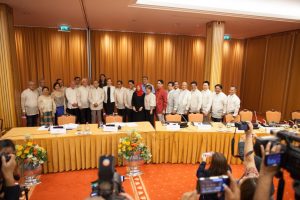NDFP, GRP determined to resolve snags, move talks forward
NDFP Media Office
Press Release
3 April 2017
 The fourth round of formal peace talks between the National Democratic Front of the Philippines (NDFP) and the Government of the Republic of the Philippines (GRP) formally opened this morning at Noordwijk, The Netherlands, with both Parties expressing determination to resolve current problems and move the talks forward.
The fourth round of formal peace talks between the National Democratic Front of the Philippines (NDFP) and the Government of the Republic of the Philippines (GRP) formally opened this morning at Noordwijk, The Netherlands, with both Parties expressing determination to resolve current problems and move the talks forward.
Shaky start
The talks were off to a shaky start, with the formal opening postponed twice–first to give the GRP panel time for internal caucus, and second for the two Parties to hold informal discussions on a bilateral interim ceasefire agreement. The fourth round of talks should have opened yesterday morning, as agreed upon in the Rome talks last January and affirmed in the 11 March 2017 Utrecht Joint Statement.
The GRP and NDFP panels last night agreed to go ahead with the formal opening today and continue talks this afternoon on the bilateral ceasefire. At the open forum, both Parties declined to comment on questions regarding the status of the talks on the bilateral interim ceasefire, preferring to wait for the final outcome at the end of this round of talks.
The atmosphere of uncertainty comes in the wake of the impasse last February after GRP Pres. Rodrigo Duterte cancelled the talks after the New People’s Army lifted its unilateral ceasefire. Duterte also ordered the rearrest of Philippine-based NDFP consultants released on bail in order to participate in the talks. One of the consultants, Mindanao-based Ariel Arbitrario, was arrested at a checkpoint in Davao City on February 5 following Duterte’s verbal orders. He was released on 29 March and is part of the NDFP delegation for this round.
The talks resumed after backchannel talks were held in Utrecht, The Netherlands last 10-11 March. Both Parties agreed to work on a bilateral ceasefire agreement in the fourth round. Meantime, they agreed to reinstate their respective unilateral ceasefires.
However, the GRP announced last 31 March that it would no longer declare a unilateral ceasefire, saying it would push for a bilateral ceasefire agreement ahead of further talks on other items in the agenda.
Common ground on social and economic reforms
In his opening remarks, Prof. Jose Ma. Sison, the NDFP’s chief political consultant, highlighted the importance of the ongoing negotiations for a Comprehensive Agreement on Social and Economic Reforms (CASER), observing that the parties’ respective drafts have enough concurrences and similar positions as common ground to be able to forge an agreements by yearend. He stressed, however, that as a matter of principle, CASER must be a step ahead of the joint ceasefire agreement being demanded by the GRP, unless both can be signed at the same time.
NDFP panel chair Fidel Agcaoili shared Professor Sison’s positive views and reiterated the wisdom of securing the approval of the CASER ahead of any single joint ceasefire agreement. He noted that ceasefires are just a means to an end, with their main purpose being to create conditions conducive to reaching agreements on basic reforms that are satisfactory to both sides.
Violations of rights accord
Agcaoili moreover raised the NDFP’s concerns over the implementation of the Comprehensive Agreement on Respect for Human Rights and International Humanitarian Law (CARHRIHL) signed in 1998, citing, among others, the promised release of 19 ailing and elderly political prisoners, the continued detention of six NDFP consultants, the unresolved cases of enforced disappearance and murder of JASIG-protected personnel under the Arroyo regime, and escalating military operations that terrorize communities. He cited statistics from the Kilusang Magbubukid ng Pilipinas, stating that up to 46 farmers have been killed under the Duterte government, half of them after the AFP declared its all-out war policy last February 2.
Agcaoili, however, acknowledged the progress made by the Duterte government in providing compensation to victims of the Marcos dictatorship.
Finally, he expressed appreciation for the efforts exerted by the Royal Norwegian Government as Third Party Facilitator, in helping the parties overcome the obstacles and realize the continuation of the formal talks as scheduled. ###
